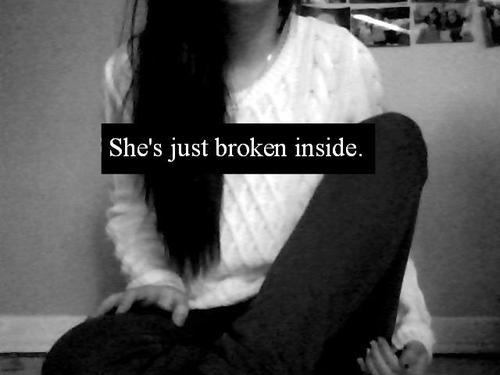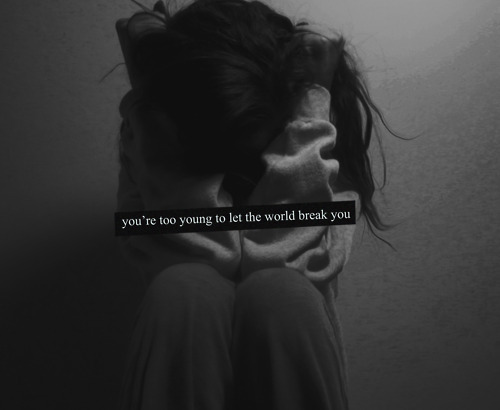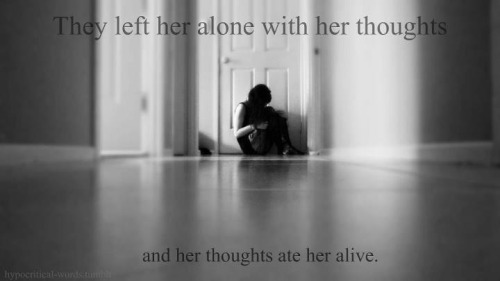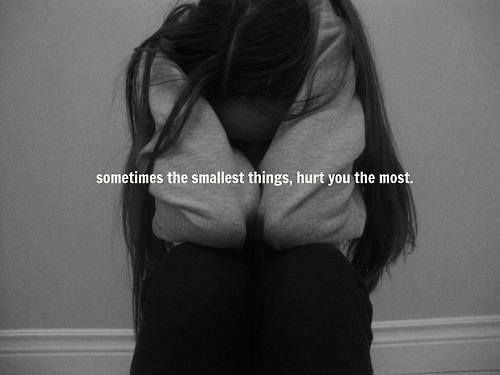Please don't romanticise mental illness
Content note: suicide, self-harm, purging.
I can't really be bothered to think up a good title for this; I'm too angry.
As a mentally ill person, I absolutely beg anyone who's reading this right now not to romanticise mental illness. I beg anyone who's reading this right now to spread the word, to tell their friends and family and loved ones and children, to go and shout it from their roofs that mental illness is a terrible thing to live through.
Please don't wonder why I care so much: I live through this. Rather, wonder why I don't welcome it.
I've seen people defend the romanticisation of mental illness with the justification that it's better than demonisation - the trouble is that it's not. They're two sides of the same thing: a refusal to deal with mental illness honestly. And here's why.
I'll start with demonisation first, because it's simpler to understand and to explain. This demonisation is dehumanising, as it strips the humanity from mentally ill people. Instead of being people who love, cry, fight, laugh, smile and struggle, we are turned into violent rapists and murderers. We are made to seem heartless and manipulative. We are labelled "worthless" and "broken" as though we are just objects who need to be "fixed" by some sane saviour. This in no way reflects the actual reality of mental illness, which is centred around the mentally ill person's own lived expericence, does not automatically make someone brutal or cruel (the idea that mentally ill people are evil is a massive misconception), and does not make a mentally ill person inferior to a sane person (matched for age, race, gender, disability and socioeconomic status I've done better for myself so far than several sane people I know - how's that for being a broken, inferior, worthless human being?).
Romanticisation is a bit more complicated, because it's not actually dehumanising mentally ill people: it seems like it's trying to understand their plight and hold them up as just as deserving of a good life as anyone else. The trouble is, it doesn't actually do that. If dehumanisation is the equivalent of abusing someone with severe damage to their face, romanticisation is the equivalent of applying a light layer of make-up to that face and proudly proclaiming that the problem's gone away. Romanticisation trivialises mental illness, even making it seem desirable and beautiful - and that's dangerous. What's worse, it still falls into the same traps as demonisation, except this time being broken is about being a skinny white girl who has enough motivation in the morning to do her hair and cry while waiting to be "fixed" by some male saviour or planning your oh-so-beautiful suicide. Who needs boring, tough things like recovery when brokenness never looked this pretty?
The truth - the ugly truth - is that mental illness is a horrible thing. There is nothing beautiful about the aching, gaping pains of psychalgia. There is nothing beautiful about being so anxious or demotivated you sit shaking in a corner for 45 minutes. There is nothing beautiful about not being able to make it out of bed in the morning, let alone managing the stairs without collapsing. There is nothing beautiful about self-harming until it looks like you have a skin disease, because the deadness of self-injury feels better than the constant pain. There is nothing beautiful about feeling so guilty every time you eat something that only emetophobia stops you from trying to throw it up. There is nothing beautiful about the flashes of suicide that come into your mind and comfort you. There is nothing beautiful about taking your own life.
I have lived through all that. I have looked into it deeply. I have stared death in the face and returned alive. I have stuck my head over the edge of the abyss and looked straight down into the bottom. And that is more courageous than any act of romanticisation.
You see, romanticisation trivialises mental illness. It glosses over all the awkward, unpleasant bits because they don't fit the narrative it's trying to shape - one of slender tragedy wrought with pointed hands, ignoring the fact that it's not really a narrative at all because it's a pointlessly, meaninglessly tragic condition and not a story.
Oh, and it's triggering.
One of the traits of the romanticisation of mental illness is that it tries to make even the most harrowing of things look beautiful - like self-harm, suicide and being dangerously underweight. I've starved myself, sawed at my arms with blades and tried to take my own life - all of which are traumatic experiences.
Romanticisation, and people who romanticise mental illness, seem not to give a flying fuck about that trauma. Sure, they might say "This blog may be triggering", but will they put trigger warnings on specific posts or images? Generally not.
Now, if you don't have any triggers you might be wondering what the fuss is all about. Surely I'm just being a big baby and should grow up already? After all, it's not like the real world has trigger warnings; I should just learn to deal with it.
The thing is, I am learning to deal with it and I have far less destructive responses to triggering things than I used to. All the same, I'd quite like to know what might be a trigger and what isn't one so that on a bad day I know what to avoid. If it helps, consider triggers like allergies: no-one chooses to be allergic to certain substances, but you still generally put warnings on them so that people know what to avoid.
What really doesn't help me is when people post idealised pictures of suicide, self-harm and being dangerously thin. They don't represent the reality of these things, the gore and vomit and the lanugo that grows over the malnourished body, but I've seen that reality. And as soon as I see those images, the memories flood my mind - no, they don't just flood my mind. They flood my body too; it's a physical reaction that leaves me frightened and in a mood to do something very destructive because I've just relived a traumatic experience.
There is one final argument for romanticisation, particularly romanticisation in literature: that it's not really romanticisation, but rather an exploration of serious topics that affect people all around the world.
Well, that's a crock of shit. That assumes that romanticisation is a good way to learn about mental illness and that all texts are romanticisation. As I've already said, romanticisation is incredibly far from the truth about mental illness - but what about the texts? Do all texts truly romanticise illness? Is this the only way we can conceive of it?
Well...no. While lots of texts do romanticise illness because it's seen as difficult to talk about, there are also some that don't - and here are three main examples.
Firstly, Les Fleurs du Mal by Baudelaire. This is one of my favourite pieces of literature right now, simply for its honesty; Baudelaire was one of the first modernists and aimed to explore the beauty in vice and evil without confusing it with goodness. Indeed, one of his poems, Un Voyage à Cythère, talks about "le courage/De contempler mon coeur et mon corps sans dégoût!" (the courage/to contemplate my heart and body without disgust), and this is a major theme in Baudelaire: the courage to face up to the evil in our world and inside ourselves, for only then can we start the process of working on that evil.
Secondly, the poems of Sylvia Plath. This is pretty much expected, because of her reception as that one mad girl who killed herself and Ted Hughes. However, if you actually read her work she was so much more than that: her poems are dark, unsettling and absurd.
Lastly, Lighter Than My Shadow by Katie Green. It's a bit different from the other two examples I've given, as the other two are poetry and this is a graphic novel, but it's every bit as honest and nearly brought me to tears at several points.
There are also some honourable mentions that aren't strictly about mental illness, but still helped me through some hard times: anything by Jean Anouilh or Eyvind Johnson, and the plays of Anton Chekhov too - and this song by Phil Ochs.
I can't really be bothered to think up a good title for this; I'm too angry.
As a mentally ill person, I absolutely beg anyone who's reading this right now not to romanticise mental illness. I beg anyone who's reading this right now to spread the word, to tell their friends and family and loved ones and children, to go and shout it from their roofs that mental illness is a terrible thing to live through.
Please don't wonder why I care so much: I live through this. Rather, wonder why I don't welcome it.
I've seen people defend the romanticisation of mental illness with the justification that it's better than demonisation - the trouble is that it's not. They're two sides of the same thing: a refusal to deal with mental illness honestly. And here's why.
I'll start with demonisation first, because it's simpler to understand and to explain. This demonisation is dehumanising, as it strips the humanity from mentally ill people. Instead of being people who love, cry, fight, laugh, smile and struggle, we are turned into violent rapists and murderers. We are made to seem heartless and manipulative. We are labelled "worthless" and "broken" as though we are just objects who need to be "fixed" by some sane saviour. This in no way reflects the actual reality of mental illness, which is centred around the mentally ill person's own lived expericence, does not automatically make someone brutal or cruel (the idea that mentally ill people are evil is a massive misconception), and does not make a mentally ill person inferior to a sane person (matched for age, race, gender, disability and socioeconomic status I've done better for myself so far than several sane people I know - how's that for being a broken, inferior, worthless human being?).
Romanticisation is a bit more complicated, because it's not actually dehumanising mentally ill people: it seems like it's trying to understand their plight and hold them up as just as deserving of a good life as anyone else. The trouble is, it doesn't actually do that. If dehumanisation is the equivalent of abusing someone with severe damage to their face, romanticisation is the equivalent of applying a light layer of make-up to that face and proudly proclaiming that the problem's gone away. Romanticisation trivialises mental illness, even making it seem desirable and beautiful - and that's dangerous. What's worse, it still falls into the same traps as demonisation, except this time being broken is about being a skinny white girl who has enough motivation in the morning to do her hair and cry while waiting to be "fixed" by some male saviour or planning your oh-so-beautiful suicide. Who needs boring, tough things like recovery when brokenness never looked this pretty?
The truth - the ugly truth - is that mental illness is a horrible thing. There is nothing beautiful about the aching, gaping pains of psychalgia. There is nothing beautiful about being so anxious or demotivated you sit shaking in a corner for 45 minutes. There is nothing beautiful about not being able to make it out of bed in the morning, let alone managing the stairs without collapsing. There is nothing beautiful about self-harming until it looks like you have a skin disease, because the deadness of self-injury feels better than the constant pain. There is nothing beautiful about feeling so guilty every time you eat something that only emetophobia stops you from trying to throw it up. There is nothing beautiful about the flashes of suicide that come into your mind and comfort you. There is nothing beautiful about taking your own life.
I have lived through all that. I have looked into it deeply. I have stared death in the face and returned alive. I have stuck my head over the edge of the abyss and looked straight down into the bottom. And that is more courageous than any act of romanticisation.
You see, romanticisation trivialises mental illness. It glosses over all the awkward, unpleasant bits because they don't fit the narrative it's trying to shape - one of slender tragedy wrought with pointed hands, ignoring the fact that it's not really a narrative at all because it's a pointlessly, meaninglessly tragic condition and not a story.
Oh, and it's triggering.
One of the traits of the romanticisation of mental illness is that it tries to make even the most harrowing of things look beautiful - like self-harm, suicide and being dangerously underweight. I've starved myself, sawed at my arms with blades and tried to take my own life - all of which are traumatic experiences.
Romanticisation, and people who romanticise mental illness, seem not to give a flying fuck about that trauma. Sure, they might say "This blog may be triggering", but will they put trigger warnings on specific posts or images? Generally not.
Now, if you don't have any triggers you might be wondering what the fuss is all about. Surely I'm just being a big baby and should grow up already? After all, it's not like the real world has trigger warnings; I should just learn to deal with it.
The thing is, I am learning to deal with it and I have far less destructive responses to triggering things than I used to. All the same, I'd quite like to know what might be a trigger and what isn't one so that on a bad day I know what to avoid. If it helps, consider triggers like allergies: no-one chooses to be allergic to certain substances, but you still generally put warnings on them so that people know what to avoid.
What really doesn't help me is when people post idealised pictures of suicide, self-harm and being dangerously thin. They don't represent the reality of these things, the gore and vomit and the lanugo that grows over the malnourished body, but I've seen that reality. And as soon as I see those images, the memories flood my mind - no, they don't just flood my mind. They flood my body too; it's a physical reaction that leaves me frightened and in a mood to do something very destructive because I've just relived a traumatic experience.
There is one final argument for romanticisation, particularly romanticisation in literature: that it's not really romanticisation, but rather an exploration of serious topics that affect people all around the world.
Well, that's a crock of shit. That assumes that romanticisation is a good way to learn about mental illness and that all texts are romanticisation. As I've already said, romanticisation is incredibly far from the truth about mental illness - but what about the texts? Do all texts truly romanticise illness? Is this the only way we can conceive of it?
Well...no. While lots of texts do romanticise illness because it's seen as difficult to talk about, there are also some that don't - and here are three main examples.
Firstly, Les Fleurs du Mal by Baudelaire. This is one of my favourite pieces of literature right now, simply for its honesty; Baudelaire was one of the first modernists and aimed to explore the beauty in vice and evil without confusing it with goodness. Indeed, one of his poems, Un Voyage à Cythère, talks about "le courage/De contempler mon coeur et mon corps sans dégoût!" (the courage/to contemplate my heart and body without disgust), and this is a major theme in Baudelaire: the courage to face up to the evil in our world and inside ourselves, for only then can we start the process of working on that evil.
Secondly, the poems of Sylvia Plath. This is pretty much expected, because of her reception as that one mad girl who killed herself and Ted Hughes. However, if you actually read her work she was so much more than that: her poems are dark, unsettling and absurd.
Lastly, Lighter Than My Shadow by Katie Green. It's a bit different from the other two examples I've given, as the other two are poetry and this is a graphic novel, but it's every bit as honest and nearly brought me to tears at several points.
There are also some honourable mentions that aren't strictly about mental illness, but still helped me through some hard times: anything by Jean Anouilh or Eyvind Johnson, and the plays of Anton Chekhov too - and this song by Phil Ochs.










Comments
Post a Comment